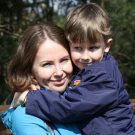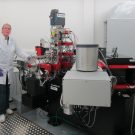Regine Schlicht is the head of the Mittelstand 4.0 – Competence Center Kiel in Germany. This center combines competences from 6 scientific institutions in Schleswig-Holstein in order to enable small and medium-sized enterprises to digitize. The previous blogpost have mainly been on women working in marine science and technology. Here we widen the scope to […]
Sharing the caring: Prof. Dr. Athanasios Vafeidis
What is the nature of your work? I´m working on assessing the impacts of future sea level rise: not only physical but also socioeconomic impacts. We account for climate change but also for socioeconomic developments. Career as a researcher. I have been relative mobile. I did my first degree in surveying engineering at the National […]
Seeking to become a female offshore professional: marine hydrology specialist Greta Kilmonaitė
Meet Greta Kilmonaitė, a young woman who has already chosen her career path and is seeking to become an offshore professional. Currently she’s a last year MSc student in the study programme Marine Hydrology at Klaipeda University and she already works as a marine hydrology specialist in the Marine Research Institute, Klaipeda University. What did […]
Sharing the caring: marine ecologist Karolin Teeveer
What is the nature of your work? Lab technician – mainly the job involves benthic and pelagic sample analysis. The job is rather stationary and due to the nature of the analysis also rather restrictive in consideration of the working environment and workplace since speciality equipment is necessary. A career as a researcher. I have […]
BEING A FEMALE SCIENTIST: A GEOECOLOGIST FOCUSSING ON THE MARINE ENVIRONMENT KERSTIN SCHIELE
Kerstin Schiele is a group leader of the marine planning group at the Institute for Baltic Sea Research Warnemünde (IOW). Kerstin studied Geoecology and ecosystem management in Germany and Australia and holds a PhD in marine biology. She benefits from her interdisciplinary background as a geoecologist as her research is at the interface between natural […]
Sharing the caring: marine ecologist Dr Rasa Morkūnė
What is the nature of your work? I’m working as a researcher at Marine Research Institute of Klaipeda University which is located at the Baltic Sea coast in Lithuania. Our institute is male-dominated as it is common in the field of marine ecology. However, I know it only from statistics – it is not really […]
International career at SYKE
Dr. Kirsten S. Jørgensen is a Leading Research Scientist at the Marine Research Center, Finnish Environment Institute SYKE, Finland. She has a 30-year long international career at SYKE Inspired during my biology studies My carrier started at the University of Århus in Denmark. As I was born in Denmark I went to study biology there. […]
Sharing the caring: head of the NanoSIMS lab Dr. Angela Vogts
What is the nature of your work? I am the head of the NanoSIMS lab at the Leibniz Institute for Baltic Sea Research. The NanoSIMS facility is open to all scientists and thus I am in contact with different working groups of the institute as well with national and international scientists. I supervise a technician […]
Being a female scientist: Aquatic Biogeochemist Emma Kritzberg
Meet Emma Kritzberg, an associate professor of Aquatic Ecology with an emphasis on biogeochemical cycling in freshwater, estuarine and marine systems. Her job includes teaching 15%, doing service (director of undergraduate studies and committee work) 25%, and doing research 60%. What did inspire you to pursue a career in marine sciences/technologies? I did my undergraduate […]
Sharing the caring: a biogeochemical modeller Dr. Friederike Prowe
What is the nature of your work? I am a Postdoc (i.e. on a temporary position) working in biogeochemical modelling funded by the GEOMAR Helmholtz Centre for Ocean Research Kiel. As a modeller, I spend most of my time working behind a desk in front of a computer. It involves mainly research and a tiny […]




